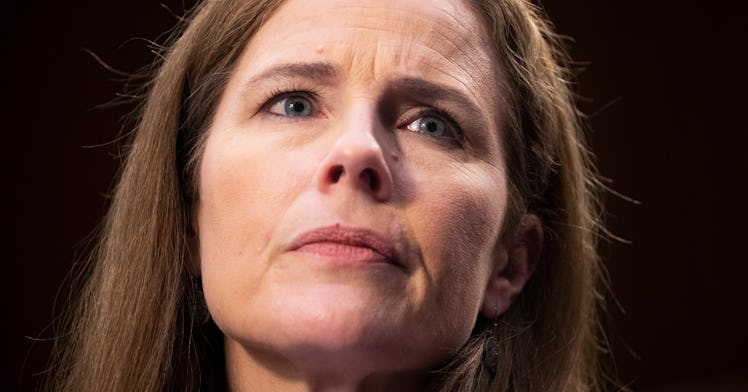Amy Coney Barrett Was Trustee At School That’s Anti-LGBTQ. Here’s What That Means
Here's what Supreme Court Nominee Amy Coney-Barrett’s involvement with the Trinity Schools, Inc., a religious school affiliated with her faith, means for LGBTQ+ families.

During the hearings for Supreme Court nominee Amy Coney-Barrett, she was asked about the legalization of same-sex marriage. In response, Coney-Barrett said Coney-Barrett said, “I have no agenda, and I do want to be clear that I have never discriminated on the basis of sexual preference and would not ever discriminate on the basis of sexual preference.” But her decision to frame sexual orientation as a “preference” or choice says quite a lot about her belief system and how she would rule once a part of SCOTUS.
It stands to reason that the community that ACB aligns herself would also inform her belief system. She’s reportedly a member of the People of Praise religious community and has served as a speaker on behalf of the Alliance Defending Freedom (ADF), which The Southern Poverty Law Center classified as an anti-LGBTQ+ hate group. Despite her insistence that she would not discriminate against the LGBTQ+ community, her choice of words caused concern about her agenda as a potential Supreme Court Justice for experts, policymakers, and lawmakers. Those policymakers who might have a concern about ACB’s belief system — and how she might approach legal issues as a result — will not be dissuaded by the recent news of her involvement as a trustee for several private Christian schools, the Trinity Schools inc., that are part of the People of Praise Community. Those schools, per reporting from the Associated Press, more or less made it clear that LGBTQ+ families were not welcome.
We know that policies that were discriminatory to LGBTQ families were put in place before Coney-Barrett became a trustee, both before she became a trustee of the People of Praise-affiliated school in 2015 and during her tenure on the board. Three of Coney-Barrett’s seven children have attended the Trinity School in South Bend, Indiana, but there are two other locations of the school in Minnesota and Virginia, respectively. Reporting from the AP paints a troubling portrait of the school’s views on LGBTQ+ families and how they treated LGBTQ+ students and families. The board that she served on is responsible for hiring the president of the school as well as “broad institutional policies,” the Associated Press reports, although the school maintains it did not break any discrimination laws when it came to their school policies.
What policies are those? The reporting shows that the school’s anti-LGBTQ+ teachings have outlined the views that, “Homosexuality is an abomination against God, sex should occur only within marriage and marriage should only be between a man and a woman,” according to the AP. One student, Tom Henry, who identifies as gay, recalled a conversation had with a prospective parent while Henry was serving as a student ambassador for the school. Henry said that one LGBTQ+ parent asked if the school was welcoming towards gay people.
Henry didn’t know how to respond and later asked the headmaster at that time, Jon Balsbaugh, who is now the president of the Trinity Schools. Henry said that Balsbaugh, “looked me right in the eye and said, the next time that happens, you tell them they would not be welcome here.” Henry added, “And he said to me that trans families, gay families, gay students, trans students would not feel welcome at Trinity Schools. And then he said, ‘Do we understand each other?’ And I said, yes. And I left. And then I quit the student ambassadors that day.” Another former student, Cara Wood, who identifies as bisexual, said, “They called it sexual preference rather than … sexual orientation and typically we just wouldn’t address it at all,” a phrasing that echoes Coney-Barrett’s own framing of sexuality during her hearing.
While Amy Coney-Barrett’s work outside of the court might not have a direct relation to what her legal beliefs are or how she would rule on the Supreme Court, it’s important to know whether or not a Supreme Court Justice would preside over a system that would discriminate against people, especially if its within the confines of the law.
This article was originally published on